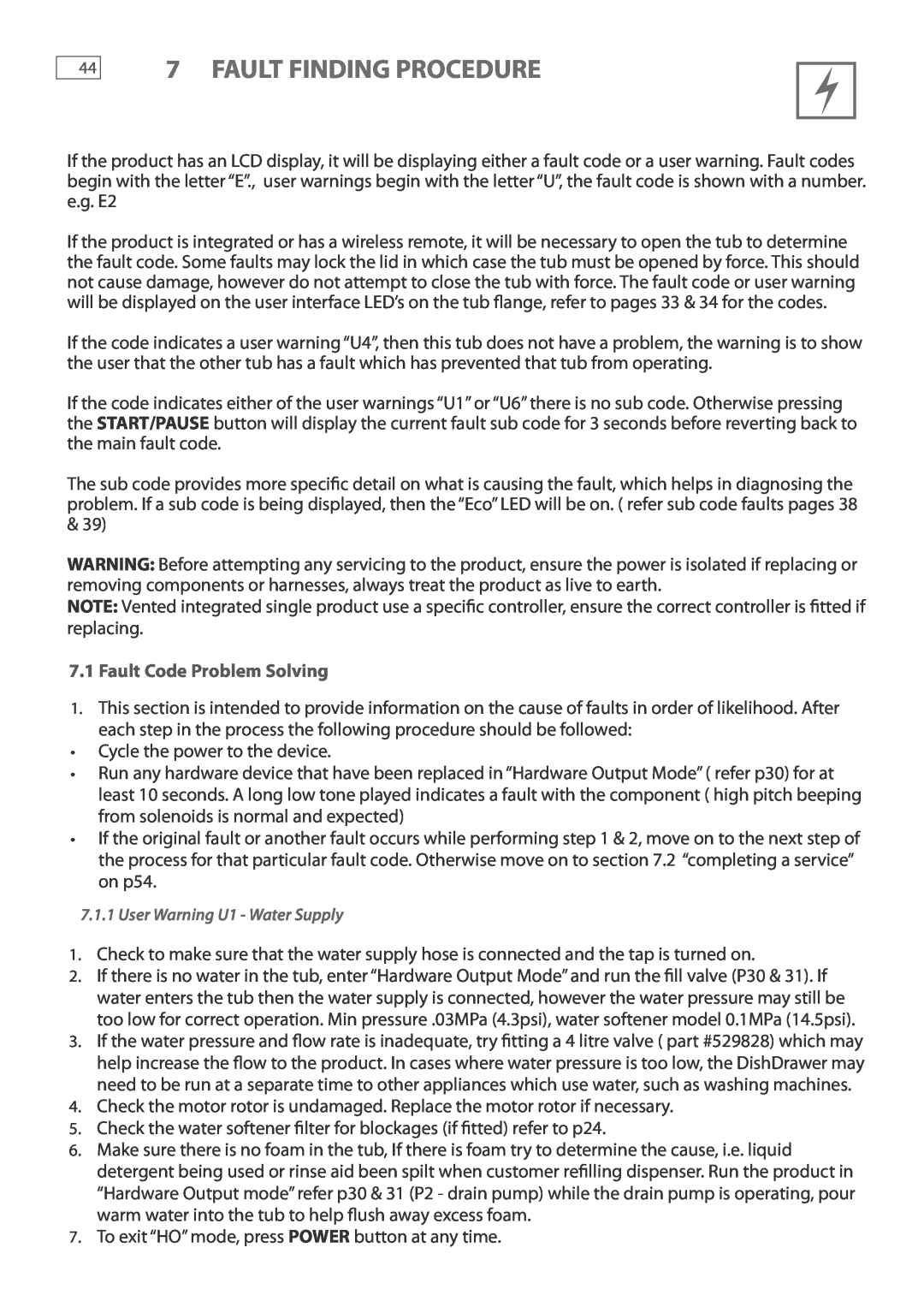Service Manual
DishDrawer
NZ AU GB IE US CA
DD607 & DD247
FEATURED PRODUCT & CONTACT ADDRESSES
Brand
Standard Double Models
Description
Standard Single Models
DD24SCW7
Single, Designer, Brushed Stainless
Tall Tub Double Models
Tall Tub Single Models
DD24SDFTX7
Single, Tall Tub, Classic White
Single, Tall Tub, Classic, Stainless Steel
CONTENTS
10 NOTES
WIRING DIAGRAMS
SERVICE PROCEDURES
1 SERVICE REQUIREMENTS
1.1.1 Electrical Safety
1.1.9 Diagnostics
1.1.2 Electrostatic Discharge
1.2 Specialised Tools
1.2.1 Static Strap
22 15/16”
2 DIMENSIONS & SPECIFICATIONS
22 15/16 ”
Component Specifications
Specification
8.0 Ohms per winding, 16 ohms phase to
Component
Hall sensor
Wash Cycle
Wash
Post
Time
DD60 Australia/New Zealand Wash Profiles
DD60 United States/Canada Wash Profiles
Wash Cycle
Wash
3 TECHNICAL OVERVIEW
3.3.1 Tub Home Sensor
3.3.4 Operation some integrated models only
3.3.2 Touch Switches
3.3.3 Wireless Remote some integrated models only
3.3.5 Wireless Receiver
Air Valve
Sluicing Jets
3.4.1 Rotor
3.4.3 Filter Plate
3.4.4 Drain Filter
3.7.1 Water Inlet
3.5.1 When Activated
3.5.2 During a Power Failure
3.7.2 Dispensing Detergent and Rinse Aid
3.7.3 Amount of Water
Flood Sensor
3.7.4 Flood Protection
3.8.1 The Heating Element
3.8.2 Heating the Water
3.8.3 Maintaining the Temperature
3.8.4 Over Heat Protection
Non Return Valve
3.11.2 Removing and Cleaning the Drain Filter and Filter Plate
3.11.1 The Filter System
3.12.1 Integrated Single Drawer Venting some models only
Strainer Spigot Strainer
4 OPTION ADJUSTMENT MODE
Not Wireless Model
4.1.2 Rinse Aid Setup rA
Setup
DishDrawer Setting
4.1.3 Water Supply Hardness Setup hd
Grains per Gallon
Parts per Million
4.2.1 Classic Models
4.2.2 Designer Models
button, which will increase or decrease the amount of LED’s on the
4.2.4 Integrated with Wireless Remote Control
4.2.3 Integrated Models
Closed Drawer autolock using the remote control
Option
Rinse aid
Water softener
5.1.2 Hardware Output Mode HO
5 DIAGNOSTICS
5.1.1 Display Mode
Rinse Aid Pump operates as a valve for diagnostic purposes only
5.1.3 Fast Cycle FC
5.1.4 Continuous Cycle Mode CC
Playing Tunes
5.1.5 Temperature and Voltage Display
5.1.6 Show Off/ Showroom Wash Mode
5.2.1 Diagnostic Mode
Program Indicators
Program Button
5.2.2 Display Mode
5.2.4 Fast Cycle Mode FC
5.2.5 Continous Cycle Mode CC
6 FAULT CODES AND POOR PERFORMANCE
Fault Code
Fault
LED Display
Possible Causes
6.1.1 Sub Code Faults
Fast, Delicate
Fast & Eco LED’s
Poor Dry Performance Non Vented
QUESTION
Is the customer complaining of
plastic items not drying?
How to resolve the
problem
Customers Complaint - food particles left on dishes
Customers Complaint - coffee/tea stains left in cups
white chalky film on them
More on next page
How to resolve the problem
7 FAULT FINDING PROCEDURE
7.1 Fault Code Problem Solving
Dry E1 - No Water in the Chassis Base
DO NOT REPLACE COMPONENTS ON A TUB WITH THIS WARNING
Wet E1- Water in the Chassis Base
Prefinished models
Fault code E2 - Sub Code 03 - Motor Not Drawing Enough Current
Controller Harness P201 Corrosion Damage Example
NOTE For more detailed component testing, refer to page
Fault Code E5 - Lid Fault
Fault Code E5 - Sub Code 01 - Not Starting
Fault Code E5 - Sub Code 02 - No Current
Fault Code E5 - Sub Code 04 - Not Stalling
Fan Housing Locking Tabs
Flap
Fault Code E7 - Detergent Diverter Valve
Fault Code E7 - Sub Code 02 - Under Current
Fault Code E7 - Sub Code 03 - Over Current
Detergent Diverter Coil Harness Pin Pin
Water softener brine pump
There are 4 sub codes which relate to this fault code
If the problem persists replace the bottom controller
8 WIRING DIAGRAMS
8.2 Power Distribution Concept
8.3 Wiring Diagram
Lower Tub Shown Only
9 SERVICE PROCEDURES
P204
P203
P202
1. Open the drawer
Rail Clip
Retaining Screw
Clip Cowling
1. Open the drawer and remove the drawer front refer section
1. Remove the drawer front refert section
1. Remove the cutlery basket and rack from the tub
1. Remove the drawer front refer Section
Drain Hose Fill Hose
Earth Wire Element Cover
Clips Clips
1. Remove the wiring cover refer section
1. Remove the tub as per section
Trim
Trim Channel
Clips Inlet Hose Flood Sensor MFB
Hex Drive Screws Rail Rear Locating Tabs
Water Valve
Wiring Harness Link Clip 15mm 3/4”
Fill Hoses Water Inlet Hose Chassis Clip
9.28 Single Integrated Vent Duct Removal Some models only
Trim Clips
T10 Torx Screw
Slide Off Tub
1. Remove the tub to gain access to the duct, refer section
1. Remove the door panel, refer section
To Pair Remote to Receiver
Pairing Procedure
Receiver Replacement Procedure
Transmit LED indicator Top Tub start button on doubles
10 NOTES
NZ AU GB IE US CA F&P PN 590409 A
11.2011
